CONFLICT RESOLUTION FOR KIDS
Conflicts can easily happen in a child’s life, whether it’s at school, the playground, or even at home with siblings. It’s up to us as parents, teachers, and carers to assist them in dealing with these challenges.
In this post, we go through eight activities and eight carefully selected picture books that effectively address the theme of conflict resolution for kids.
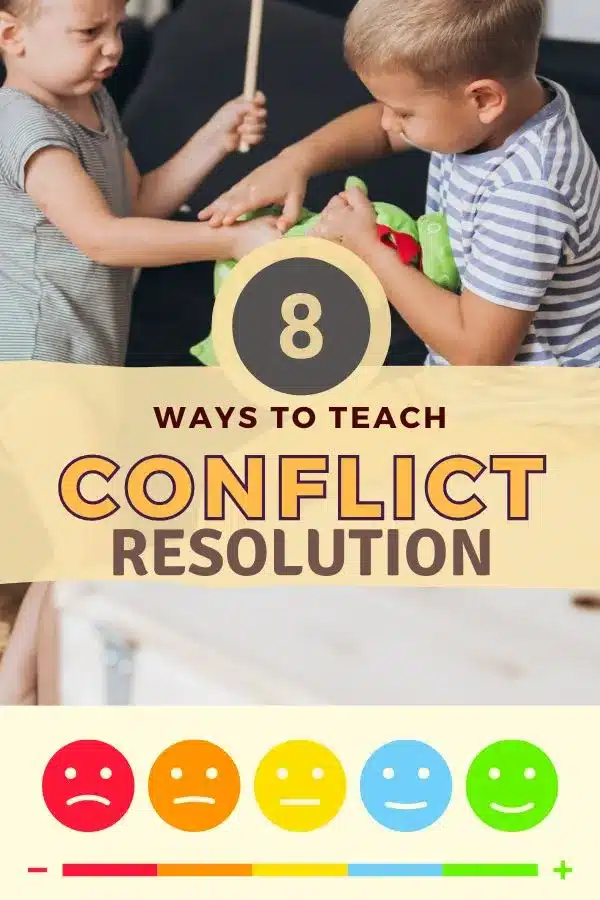
Related articles:
Effective Strategies To Resolve Conflicts
1. Take a moment to calm down. Engaging in calming activities can be beneficial.
2. Communicate effectively. It’s crucial to express what each person wants or doesn’t want.
3. Listen to the other person.
4. Explore positive alternatives.
5. Show respect for the opinions of others.
Activities To Teach Conflict Resolution For Kids
Let’s take a look at some practical ways kids can develop conflict resolution skills.
1. MINDFULNESS EXERCISES
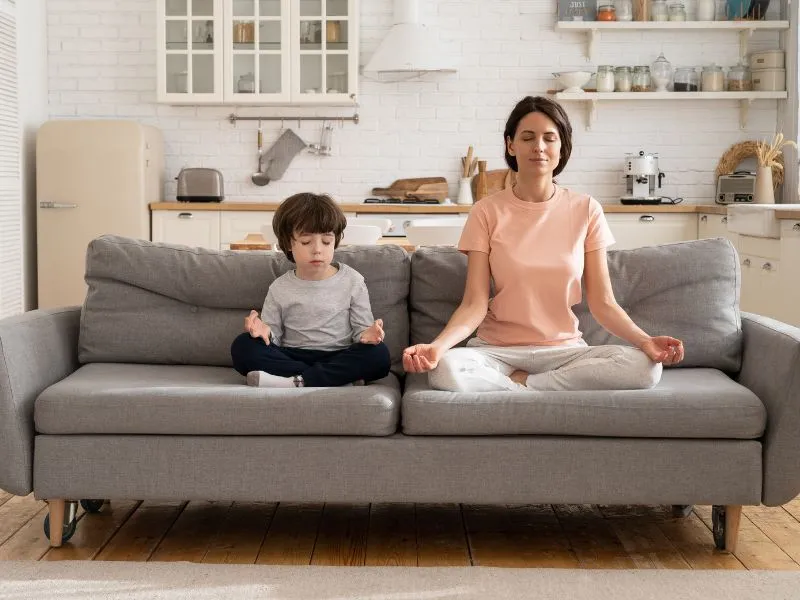
Getting emotional doesn’t help in resolving conflicts. It’s important to remain calm in these situations.
Children should practice calming activities to learn this skill.
Teach children mindfulness techniques such as deep breathing or meditation. This will help them calm down and think more clearly during conflicts.
Learn these 10 creative calming activities for kids.
2. THE “I FEEL” STATEMENTS
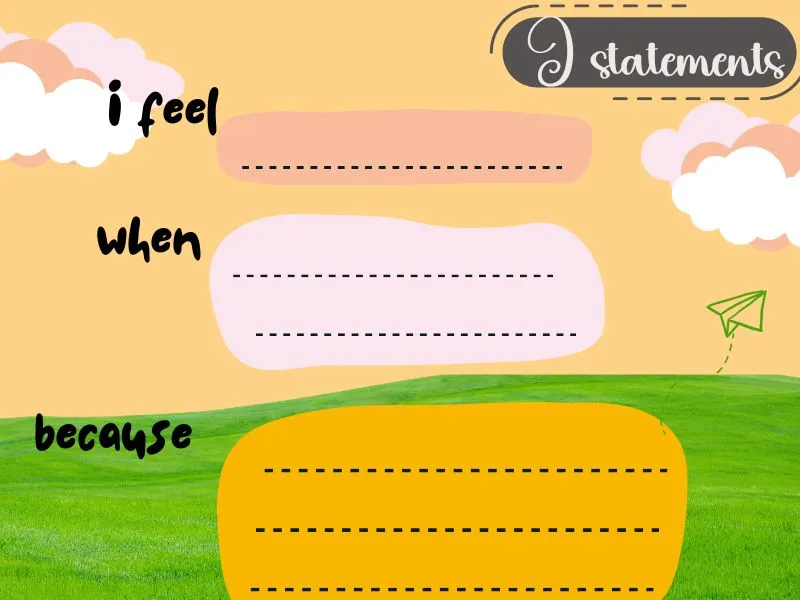
Teach children to express their feelings using “I feel” statements. This promotes assertive communication rather than blame.
3. IDENTIFY THE FEELINGS
Use flash cards or drawings to help children identify and express their feelings. This can lead to a better understanding and resolution.
Download this list of emotions activity sheet.
Just like the flash cards, you can also play the Guess the Feelings game. Show various facial expressions to your child and have them guess the emotions.
You can also talk about different feelings and expressions. This is a good way to help children develop emotional intelligence by understanding the emotions of others.

4. Listening Games
Children can better understand how others feel and see things differently when they listen carefully.
This helps them navigate conflicts more effectively.
Try these 12 listening activities with your kids.
5. CONFLICT RESOLUTION GAMES
You can play board games that require teamwork and cooperation. These games promote healthy competition and teach children to manage conflicts.
- Race to the Treasure: This game is designed to promote teamwork and shared decision-making.
- LEGO Building Challenges: Create building challenges for your children. They need to work together to achieve a common goal. This promotes teamwork and problem-solving.
6. TEAM-BUILDING ACTIVITIES
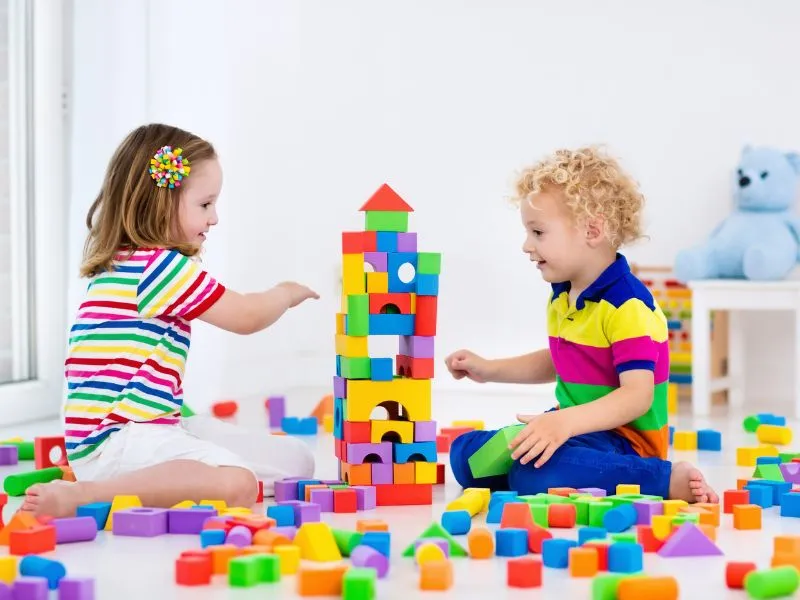
Plan group activities that require teamwork, like building a tower with limited resources. This can help children learn the value of cooperation and problem-solving.
Organise challenges that require teamwork and problem-solving.
7. Role-playing scenarios
Role playing is an effective method to imitate real-life conflicts. You can create various scenarios where conflicts might arise.
Have children act out different roles, practicing effective communication and problem-solving.
These are different role playing scenarios you can try,
Choosing a Game: A group of friends can’t agree on what game or activity to do during free time. They need to agree on something everyone likes to play.
Lunchtime Conflict: Children at a lunch table have conflicting preferences for what to eat. They must find a solution that accommodates everyone’s choices.
Sharing a Toy: Two children want to play with the same toy. Create a scenario where they have to figure out a fair way to take turns.
Deciding Movie Night: Friends or siblings need to find a film that everyone is happy with.
8. BE A ROLE MODEL
Teaching conflict resolution for kids means showing good behaviour, communication, and problem-solving skills as an example to follow.
Picture Books About Conflict Resolution For Kids

These picture books aren’t just about pretty illustrations and catchy rhymes (although those are pretty awesome too). They’re filled with many valuable lessons on how to deal with conflicts.
“Llama Llama and the Bully Goat” by Anna Dewdney
Age Group: 2-5 years
This book follows Llama Llama as he deals with a classmate who is behaving like a bully. Great story to teach children about the importance of understanding and resolving conflicts.
“The Squirrels Who Squabbled” by Rachel Bright
Age Group: 3-5 years
Two competitive squirrels, Nut and Bolt, learn the importance of cooperation and sharing through their entertaining and humorous adventures.
Talk to your kids about the benefits of collaboration and finding common ground when dealing with others.
“The Berenstain Bears and the Trouble with Friends” by Stan and Jan Berenstain
Age Group : 4-6 years
The Berenstain Bears series often addresses common childhood issues. In this book, Brother Bear learns about the challenges and rewards of friendship, emphasising communication and conflict resolution.
“What Do You Do With a Problem?” by Kobi Yamada
Age Group: 4-8 years
This book guides children through the journey of resolving conflicts by encouraging them to face problems head-on and explore creative solutions.
You can talk to your children about how to see challenges as chances to grow as you read the book.
“A Weekend with Wendell” by Kevin Henkes
Age Group : 4 – 8 years
Another great book highlighting conflicts between cousins. In the book, Wendell comes over to Sophie’s house for the weekend, and they face various conflicts.
The story explores how the characters learn to understand each other and resolve their differences.
“The Fort” by Laura Perdew
Age Group: 4-8 years
Through the captivating story of a group of friends building a fort, this book teaches lessons on understanding, compromise, and the power of finding peaceful solutions to disagreements.
Kids will live in the story and embrace the lessons with the dynamic and charismatic illustrations.
“The Recess Queen” by Alexis O’Neill
Age Group: 5-7 years
This book tells the story of a recess queen, Mean Jean, and how she learns to befriend a new student, Katie Sue. You can talk about playground conflicts and finding peaceful solutions without adult supervision.
“Enemy Pie” by Derek Munson
Age Group: 5-8 years
This story revolves around a boy who discovers a recipe for “enemy pie” from his dad. The process of making and sharing the pie leads to unexpected friendship and resolution.
The charming illustrations in this book will keep kids engaged and they will learn about dealing with conflicts.
Benefits Of Learning About Conflict Resolution For Kids
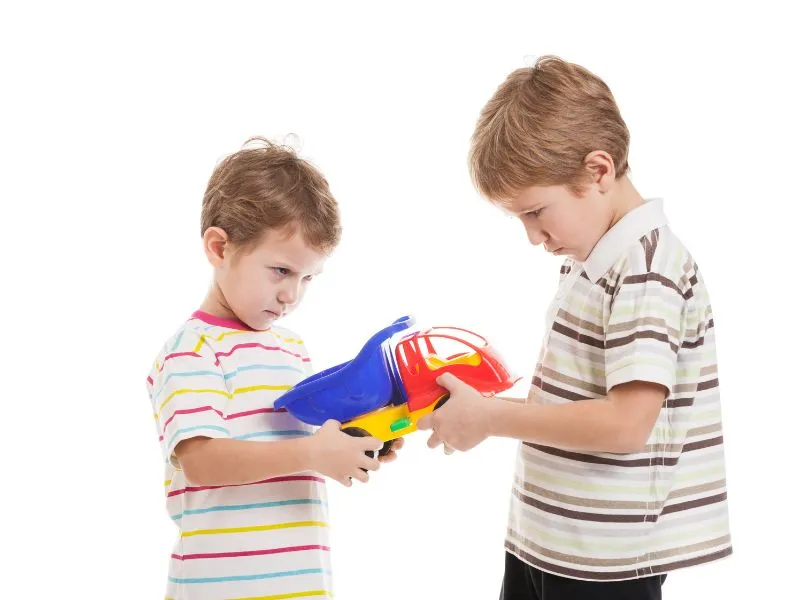
Learning about conflict resolution is important for developing crucial skills in early childhood development.
These skills will continue to shape their behaviour throughout their lives.
- Improved Communication Skills: Teaching conflict resolution in the early years helps children develop effective communication skills. It helps them to express themselves clearly and listen actively.
- Enhanced Empathy: Children develop empathy as they learn to understand others’ perspectives, promoting a compassionate and understanding approach in relationships.
- Building Emotional Intelligence: It helps the development of emotional intelligence by recognising, managing, and expressing emotions in an effective manner.
- Establishing Healthy Relationships: It lays the foundation for forming positive relationships, as they build stronger connections with peers and adults.
- Problem-Solving Abilities: Children who are familiar with conflict resolution techniques develop strong problem-solving skills. This will help them find creative solutions to challenges they may face in various aspects of their lives.
- Reducing Aggressive Behaviour: Conflict resolution education helps in mitigating aggressive behaviour by teaching children alternative ways to address conflicts.
- Promoting a Positive Classroom Environment: Implementing conflict resolution strategies in early education contributes to a positive and supportive classroom environment.
- Preventing Bullying: Children learn to handle conflicts peacefully, reducing the likelihood of engaging in or becoming victims of bullying behaviour.
- Encouraging Teamwork: Conflict resolution skills facilitate effective teamwork and collaboration as children learn to work together, share ideas, and resolve disagreements constructively.
- Resilience: Learning to resolve conflicts early in life provides children with lifelong coping mechanisms. This helps them navigate challenges in a healthy and resilient manner.
- Preparing for Future Challenges: Early exposure to conflict resolution prepares children for the complexities of adult life, equipping them with essential skills to navigate relationships, workplaces, and other social settings successfully.
Wrapping Up
Teaching kids about conflict resolution is a valuable investment in their personal and social growth.
There are effective strategies that can be used to help our children develop the necessary skills to manage disputes.
Picture books are also an excellent tool to teach these important life skills.

Leave a Reply